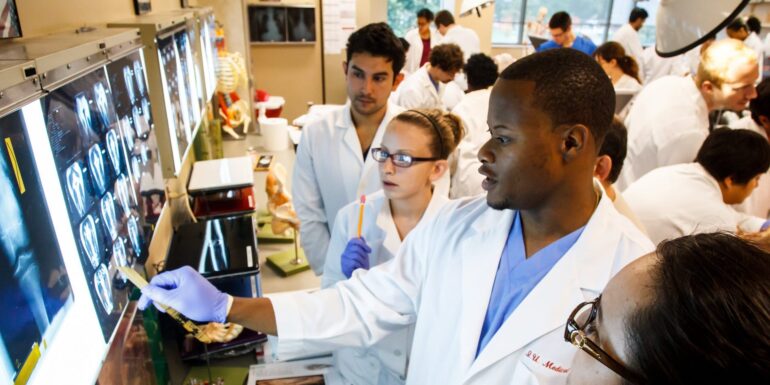There isn’t a single area that has been unaffected by technological advancements; from manufacturing to marketing and medical, the world has become reliant on intelligent solutions in a variety of fields. We employ artificial intelligence (AI) to generate better predictions, automation to make people’s work easier, software tools to automate and streamline operations, and advanced web platforms for anything from sales to research.
The value of technology has long been recognized in the medical area. To give the best possible care to their patients, physicians, surgeons, lab technicians, EMTs, and everyone in-between relies on innovative tech-based tools and approaches. Furthermore, medical education has advanced significantly as a result of the use of technology and digital solutions. Here are some of the ways that technology has impacted the overall education system
Benefits of Technology in the Education
It Establishes a Link Between You and Your Students.
Digital material, distribution, and surroundings are all known to today’s pupils. Try to locate a class where no one uses Facebook, TikTok, or Minecraft. They’re used to using digital resources for more than simply games and entertainment. Video calling will be used to communicate with grandparents, and touchscreens will be used to place food orders.
Students Are More Engaged with Digital Sources.
Digital sources are not only familiar to students, but they also engage them more. Digital signage attracts five times the amount of attention as static signage and has a retention rate of between 13 and 41 percent.
It’s not just about the displays. Because it’s more likely to be current and provided in a way that students enjoy, digitally sourced material is more engaging and effective. Sixty-five percent of instructors believe digital sources enable them to illustrate concepts that they couldn’t present otherwise, such as how atoms operate, how riverbanks crumble, or how geometric progression may lead to you losing your empire one grain of rice at a time. Without digital technology, how could things be successfully demonstrated to students? Physical representations of the past either don’t allow for them or are inadequate in contrast.
Students Are Better Prepared for Their Future Jobs as a Result of This Program.
Whether they leave school for work, higher study, or to start a business, every student has a potential career. Many people will go on to do all three at some time in their life. And you won’t be able to achieve any of these unless you’re a confident and capable user of digital technology. All future jobs will need digital skills and a level of IT proficiency.
Students Start Their Career With the Help of Technology
Technology does not only help students in their studies, but also it helps them to grow more and more by securing their careers. With the help of technology, students can do anything like starting any online service through which you can provide services to the students which also helps you to understand everything clearly for the future. You have seen many students in Dubai providing cheap assignment writing service in Dubai in student life because it also enables them to be better in assignment writing.
Importance of Technology in Medical Education
Because of the Decreased Costs, There is More Availability.
Obtaining a medical degree has traditionally been seen as a prestigious endeavor, especially given the scarcity of such opportunities. Many families are unable to afford to relocate to larger cities, let alone pay for school, medical textbooks, or unpaid internships. More individuals in underdeveloped nations may now acquire their medical education thanks to the proliferation of online medical lectures, many of which are available for free or at a significantly reduced cost on various platforms.
The Price
According to a 2012 survey, medical gadgets account for between 5 and 6% of the billions of dollars spent on healthcare each year. At first look, something may appear to be nothing. The cost might be a considerable barrier for hospitals and clinics with limited resources. According to a Technology Review article from a prestigious university, many economists believe that healthcare has a bleak financial future, owing to the associated expenditures.
Compliance with Meaningful Use
The Centers for Medicare and Medicaid Services (CMS) Incentive Programs encourage healthcare institutions to adopt electronic health records in meaningful ways, although many facilities struggle to reach this goal. Professionals who do not follow meaningful use standards may have their Medicare reimbursements reduced, which could exacerbate financial issues for clinics and hospitals that are already struggling.
Diversification and Digital Learning Materials
Despite the fact that studying medicine requires extremely particular materials and courses, there are methods to make the learning process easier and more interesting to people with different learning styles. Improved abilities at home can assist students to deal with the stress of a real-world situation if they desire to learn advanced cardiac life support techniques and work in challenging conditions. Medical students may enhance highly specialized and detailed abilities such as airway management in ACLS online training, which will be beneficial in emergency scenarios, thanks to online courses and video-based lectures.
Advanced Talents Will be Aided by Virtual Reality.
Virtual reality may be highly useful for medical vocations that require constant and extensive practice before entering a real-life environment, such as training to become a surgeon. Future physicians can use the embedded AI to better correctly diagnose their faults, learn about alternative and more successful techniques, and hone their craft over time. VR technologies can benefit prospective medical practitioners in all fields of medicine since working in a virtual environment relieves stress while giving a genuine sense of the task to be done.


